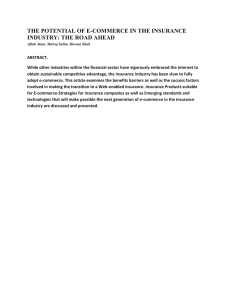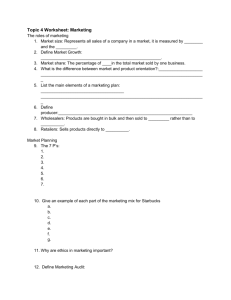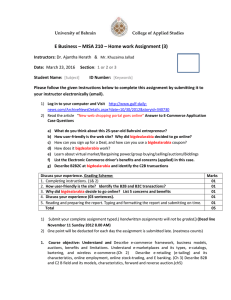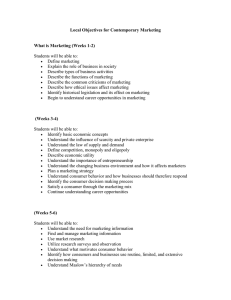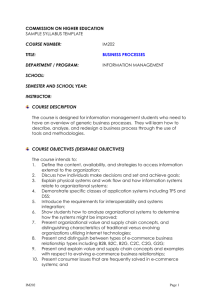Strategies for the New Economy Chapter 5 Electronic Commerce 1
advertisement
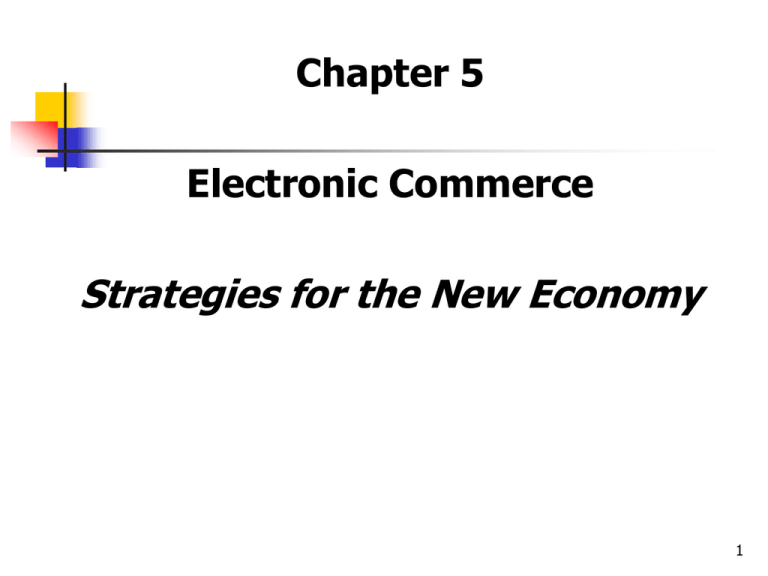
Chapter 5 Electronic Commerce Strategies for the New Economy 1 Sales -Cost of goods sold -= Gross margin Income Statement --expenses -Wages -Rent -Insurance -Phone -Advertising -Postage -Electric -=Net income 2 Introduction The new economy introduced by the www has been interesting. Fortunes have been made and lost. Dot-com millionaires have been created. Others have seen their company turn into a dot-bomb. The revolution of ebusiness promised by the internet has just began. We are still learning what works and what does not work. There is still a lot of uncharted territory ahead. 3 The Growth of E-Commerce Figure 5.1 Four Categories of E-Commerce page 178 4 The Growth of E-Commerce E-commerce Enables customers, consumers and companies to form powerful new relationships that would not be possible without the enabling technologies The internet facilitates commerce by its ability to move ________ information at low cost. 5 The Growth of E-Commerce The Digital Divide Digital divide Expresses the fact that different peoples, cultures, and areas of the world or within a nation do not have the same access to ___________ and telecommunications technologies. 6 The Advantages of Business To Consumer E-Commerce just another channel by which to reach their customers?? a channel with some unique and powerful advantages over traditional channels Know When to use it How to use it effectively and When to use it in ___________ with other channels Is key. 7 The Advantages of Business To Consumer E-Commerce advantages over ‘_________’ stores: Shopping can be faster and more convenient Offerings and prices can change instantaneously Call centers can be integrated with the web site Broadband telecommunications will enhance the buying experience 8 The Advantages of Business To Consumer E-Commerce Shopping Can Be Faster and More Convenient Figure 5.3 Alternative Channels for Selling to Customers page 182 9 The Advantages of Business To Consumer E-Commerce Offerings and Prices Can Change Instantaneously E-tailers can change product offerings and prices instantaneously in response to changes in customer demand. 10 Keys To Success In Business To Consumer E-Commerce Important lessons of e-commerce: Commodity like items work best. Digital products are the best of all. Attracting and retaining customers. Remember the importance of merchandising. You must execute well. Watch the competition. 11 Keys To Success In Business To Consumer E-Commerce Remember the Importance of Merchandising Figure 5.3 Dos and Don’ts of Web Site Design page 188 12 Business to Business E-Commerce B2B e-commerce is e-commerce that takes place between organization. Companies do business with other companies all over the world. Example: an airline needs to buy Aircraft fuel Spare parts Food Other From other companies 13 Business to Business E-Commerce Relationships in B2B take different forms in the e-commerce environment: Value networks Corporate purchasing segments Next-generation solutions B2B marketplaces Intranets and extranets 14 Business to Business E-Commerce Value Networks More and more in e-commerce involves a complex network of relationships to operate between the enterprise, its customers, intermediaries, complemetors and suppliers 15 Business to Business E-Commerce Value Networks Figure 5.6 The Value Network page 194 16 Business to Business E-Commerce Corporate Purchasing Segments In B2B, most attention has been given to the ways that e-commerce could streamline the purchasing of materials 17 Business to Business E-Commerce Corporate Purchasing Segments Purchasing applications are usually divided into three segments: 1. Purchasing of direct materials 2. Purchasing of indirect materials (MRO) 3. Purchasing of services 18 Business to Business E-Commerce Corporate Purchasing Segments The most important form of B2B ecommerce today is electronic data interchange or EDI 19 Business to Business E-Commerce Corporate Purchasing Segments Figure 5.7 An EDI Huband-Spoke Arrangement page 196 20 Business to Business E-Commerce Corporate Purchasing Segments Figure 5.8 How Value-Added Networks (VANs) Facilitate EDI page 197 21 Business to Business E-Commerce Next Generation Solutions Efforts are underway to create a new generation of EDI for the B2B transactions that would be Easier to setup and use More attractive to small businesses 22 Business to Business E-Commerce B2B Marketplaces B2B marketplaces - Internet-based services that bring together buyers and sellers. They give the potential to bring together large numbers of buyers and sellers giving buyers more choices and aggregating demand for the sellers Transaction costs can be reduced 23 Business to Business E-Commerce Intranets and Extranets Figure 5.10 Intranet Structure page 201 24 Business to Business E-Commerce Intranets and Extranets Figure 5.11 Extranet Structure page 202 25 The Role OF E-Government E-Government - describes the application of e-commerce technologies in governmental agencies. In many countries the government is the largest hub to use EDI for ecommerce activities. 26 E-Commerce Payment Systems EDI transactions are for purchase orders and other standard business documents Financial EDI (FEDI) - the use of EDI for payments. 27 E-Commerce Payment Systems E-payments would solve traditional timing problems such that: Epayments would clear faster and The payer would lose the use of that money for those extra few day it would have taken for the check to clear. 28 E-Commerce Payment Systems Credit Cards and Smart Cards Smart cards - plastic cards the size of a credit card that contain an embedded chip on which digital information can be stored. 29 E-Commerce Payment Systems Financial Cybermediaries Figure 5.12 The PayPal Web Site page 204 30
